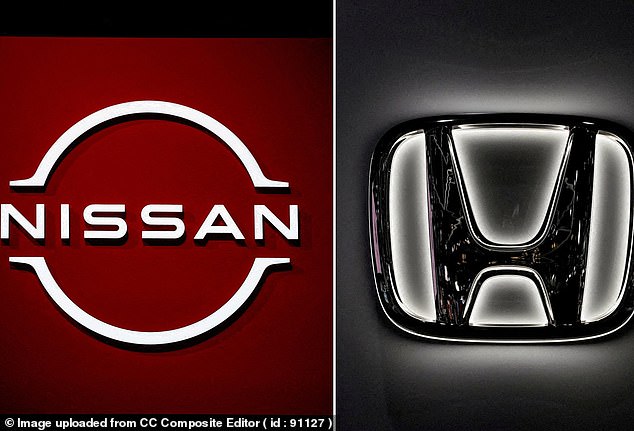Table of Contents
- Honda and Nissan revealed that they had signed a memorandum of understanding
- They said a partnership could potentially help them “maintain global competitiveness.”
Honda and Nissan are weighing a merger amid an intense battle to capture the booming electric vehicle market, which could make it the world’s largest automaker by sales.
The Japanese car giants revealed that they had signed a memorandum of understanding (MOU) on a possible business integration, together with Mitsubishi Motors, a smaller member of the Nissan alliance.
They said a partnership could potentially help them “maintain global competitiveness” and offer “more attractive” products and services as the auto industry experiences massive upheaval.
Honda and Nissan agreed to consider collaborating on developing electric vehicle technology in March, before deciding in early August to conduct joint research on autonomous driving and share electric vehicle components such as batteries.
A merger between the long-standing competitors, which are also Japan’s second and third largest automakers, and Mitsubishi would create a business worth more than $50 billion in market capitalization.
United: Nissan and Honda revealed that they had signed a memorandum of understanding on a possible business integration, together with Mitsubishi Motors, a smaller member of the Nissan alliance.
The companies say the deal would offer standardization of vehicle platforms, reducing costs and creating stronger products, optimization of factories and integration of research and development functions.
Makoto Uchida, CEO of Nissan, said: “I believe that by bringing together the strengths of both companies, we can deliver unparalleled value to customers around the world who appreciate our respective brands.
“Together we can create a unique way for you to enjoy cars that neither company could achieve alone.”
Traditional automakers are struggling to compete with new EV makers, particularly those from China, which dominate the rapidly expanding EV market.
Chinese electric vehicle companies have benefited from generous government subsidies, tax breaks and China’s access to critical raw materials such as graphite and refined rare earth metals.
Shenzhen-based BYD overtook Elon Musk’s Tesla to become the world’s best-selling electric vehicle maker last year after selling more than 3 million cars.
Nissan’s Leaf vehicle was the world’s most popular electric vehicle in the early 2010s, but its popularity has declined amid increased competition, contributing to Nissan’s severe financial difficulties.
Last month, the group announced it would cut 9,000 jobs and cut global production capacity by a fifth as it posted a £47.2m loss in the third quarter.
Shortly after, Fitch Ratings downgraded Nissan’s credit outlook to “negative,” citing the company’s declining profits and weaker-than-expected performance in North America.
Honda also revealed last month that its first-half profit fell about 20 percent to $3.2 billion due to falling sales volumes in China.
Toshihiro Mibe, president of Honda, said: “Bringing together resources, including the knowledge, talents and technologies that Honda and Nissan have been developing for many years, is essential to overcome challenging environmental changes.”
The Sunday Times reported that Honda could make vehicles at Nissan’s major Sunderland plant as part of a partnership, after stopping all car production in the UK three years ago.
DIY INVESTMENT PLATFORMS

AJ Bell

AJ Bell
Easy investing and ready-to-use portfolios

Hargreaves Lansdown

Hargreaves Lansdown
Free Fund Trading and Investment Ideas

interactive inverter

interactive inverter
Fixed fee investing from £4.99 per month

sax

sax
Get £200 back in trading fees

Trade 212

Trade 212
Free trading and no account commission
Affiliate links: If you purchase a This is Money product you may earn a commission. These offers are chosen by our editorial team as we think they are worth highlighting. This does not affect our editorial independence.


